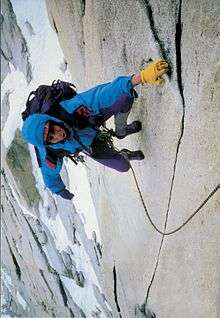Paul Pritchard
Paul Pritchard (born 1967 in Bolton, Lancashire) was one of the leading British climbers[1] of the 1980s and 1990s. He started climbing at 16 in his native Lancashire, and within a year had started to repeat some of the hardest routes in the county, as well as beginning his own additions.

Pritchard made many ascents of outstanding problems in the Wilton Quarries, Anglezarke and Hoghton as well as playing a pivotal role in the early development of both Craig y Longridge and Thorn Crag and engaging in extensive exploration of Malham Cove.
In 1986 he moved to Llanberis in North Wales, climbing extensively on the slate of the Llanberis quarries and on the sea cliffs at Gogarth, situated between North Stack and South Stack, near Holyhead. He gained a reputation for climbing hard and very poorly protected routes such as Super Calabrese (E8 6b) at Gogarth, still considered one of the most serious routes in the UK.[2] In 1990, he began mountaineering, and subsequently climbed many difficult mountain routes around the world. This also included multiple attempts on the then unclimbed Shark's Fin on Meru Peak, in the Indian Himalayan Region. He won the 1997 Boardman Tasker Prize for Mountain Literature for his book Deep Play. [3]
On Friday 13 February 1998, Pritchard's life changed drastically when he was struck in the head by a falling boulder while attempting an ascent of the Totem Pole, a slender sea stack off the coast of Tasmania. He was rendered semiconscious, bleeding, and nearly helpless. Over the next hours a heroic rescue was effected by his partner, Celia Bull.[4] He was left suffering from hemiplegia, a condition that robbed him of feeling and movement in his right side and which caused his speech and memory to suffer.[5]
Pritchard has continued to lead a challenging life even after the catastrophic injury. He has climbed Kilimanjaro, ridden a recumbent trike through Tibet to Mount Everest and took the lead rock climbing again. In 2016 Paul finally climbed the Totem Pole, 18 years after his accident[6]
In 2017 Pritchard, and 4 other people with disabilities, accomplished the first journey under human power between Australia’s extremities of altitude. On the Lowest To Highest Expedition the team members cycled from Kati Thanda-Lake Eyre (-15m) to Kosciuszko -Targangil (2228m), a distance of 2152km.
Pritchard has written three books:
- Deep Play (1997) is about his early climbing experiences
- Totem Pole (1999) about his accident and his recovery from it
- The Longest Climb (2005) continues his story of recovery
He won the Boardman Tasker Prize for Mountain Literature for each of the first two of these. Totem Pole was also awarded the 1999 Banff Mountain Book Festival Grand Prize.
References
- Vause, Mikel (May 2005). Peering over the edge: the philosophy of mountaineering. Mountain N' Air Books. pp. 303–. ISBN 978-1-879415-42-3. Retrieved 28 June 2011.
- Farquar, Grant (2018). The White Cliff - Epic tales of life and death on the world's best sea cliff (1st ed.). Atlantis Publishing. ISBN 1999960009.
- "1997 Winners". Bordman Tasker Award. Retrieved 27 September 2018.
- Paul Pritchard and the Totem Pole (audio file). BBC Witness. Broadcast February 3, 2019. Retrieved February 3, 2019.
- Pritchard, Paul (1999). The Totem Pole: And a Whole New Adventure. Mountaineers Books. ISBN 0898866960.
- Rääbus, Carol. "Paul Pritchard climbs Tasmania's Totem Pole 18 years after it nearly killed him". ABC News. ABC. Retrieved 27 September 2018.